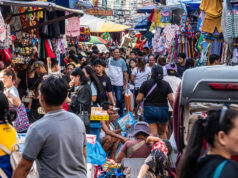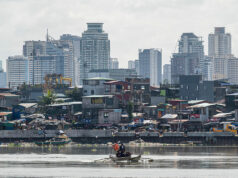#COVID-19 Regional Updates (06/04/20)
Number coding for vehicles in Metro Manila back on June 8 with exemptions; Duterte orders opening of more bus routes
THE number coding scheme intended to reduce vehicles on Metro Manila roads will again be in effect starting June 8, but with exemptions in consideration of the coronavirus crisis.
The Metropolitan Manila Development Authority (MMDA), in a statement on Thursday, listed the following exemptions:
• All private vehicles with at least two passengers, including the driver, who must observe minimum the health safety protocols of physical distancing wearing of face mask;
• owner-driven or self-driven private vehicles transporting doctors, nurses, and other medical personnel; and
• vehicles transporting Authorized Persons Outside Residence (APOR) as identified in the latest guidelines of national task force.
Ride-hailing service cars must have a signage indicating that these are registered as transport network vehicle service (TNVS).
Meanwhile, President Rodrigo R. Duterte has ordered the opening of more bus routes to serve commuters, according to his spokesperson.
In a briefing on Tuesday, Palace Spokesperson Harry L. Roque said Mr. Duterte felt the anguish of workers over the longstanding problem of mobility.
Mr. Roque said the Transport department is opening additional routes Friday, and more on Monday.
The additional routes starting Friday are: between Monumento and Balagtas; Bulacan-EDSA and Montalban; and the Ninoy Aquino International Airport Loop.
By Monday, the following will also operate: Monumento-Valenzuela Gateway Complex; Gilmore-Taytay; and Monumento-San Jose Del Monte.
Officials were scheduled to meet with bus operators Thursday afternoon to discuss the deployment of more units. — Gillian M. Cortez
Metro Manila pollution on steady rise as lockdown eases
AIR pollution levels in the capital have steadily increased since the beginning of May when government started to slowly ease quarantine restrictions, according to a report by Greenpeace and the Center for Research on Energy and Clean Air (CREA).
“Analysis of these two pollutants from March 15 to May 15, 2020 shows an initial and dramatic drop in air pollutant concentrations at the beginning of the lockdown, and the gradual rebound during the modified enhanced community quarantine,” says the report titled The Special Report on Managing Air Quality Beyond COVID-19.
Increasing air pollution levels were attributed to more vehicles traversing Metro Manila’s highways and industries resuming operations.
Greenpeace and CREA called for the immediate adoption of measures that protect the air quality in Metro Manila.
“Air pollution doesn’t have to be an inescapable reality. The enhanced community quarantine gave Filipino citizens a glimpse of what cities can be like with healthy, clean air. It also showed us that air pollution can be solved without sacrificing people’s access to mobility,” Greenpeace campaigner Rhea Jane Pescador-Mallari said.
“Moving forward, if the government is willing to use the opportunities and lessons learned from the pandemic and amplify it through policies and infrastructure, active mobility and micro mobility, as well as invest in efficient and safe mass public transport, then a return to the massive pollution levels before COVID-19 can be avoided.” she said.
Meanwhile, the House of Representatives committee on climate change has consolidated and approved two House resolutions declaring a climate and environmental emergency.
The resolutions call for immediate action from government agencies to mitigate the adverse effects of climate change.
House Resolutions 724 and 761 are authored by Antique Rep. Lorna Regina B. Legarda and Bohol Rep. Edgardo M. Chatto, respectively.
“Despite the enactment of landmark policies on the environment, climate change and disaster risk reduction and management, there is still continued decline of the state of the environment, and its ecological system is one of the greatest threats to the people’s well-being,” Ms. Legarda said in her resolution.
Mr. Chatto, in his resolution, said, “In declaring a climate emergency, a government admits that global warming exists and that the measures taken up to this point are not enough to limit the changes brought by it. The decision stresses the need for the government and administration to devise measures that try and stop human-caused global warming.” — Revin Mikhael D. Ochave and Genshen L. Espedido
Limited land transport holding back Davao airport reopening; City gov’t proposes no-test, no-fly policy
DAVAO CITY — Aviation authorities managing the international airport here want public land transport normalized first before reopening for commercial flights.
“DIA (Davao International Airport) is a transit point, meaning not all passengers who fly in and out are residents of Davao City but from neighboring regions. Given this, there is a possibility that non-Davao City residents will be stranded here,” Airport Manager Rex A. Obcena said in a virtual briefing.
He also noted that even provincial buses within the Davao Region are still on limited operations.
Most of Mindanao, excluding Davao and Zamboanga cities which have the highest coronavirus cases, is already on relaxed quarantine rules but most local governments are still implementing border restrictions.
Mr. Obcena said Davao Mayor Sara Duterte-Carpio has sent a letter to Transport Secretary Arturo P. Tugade, through the Civil Aviation Authority of the Philippines (CAAP)-Davao office, requesting for time to set up an airport pick-up system to avoid people getting stuck in the city.
The city government, in coordination with the Land Transport Franchising and Regulatory Board, is aiming to have the transport service organized by the end of this week.
Mr. Obcena said CAAP-Davao is aiming to gradually reopen the airport by June 8 for domestic commercial flights.
DIA has only been catering to sweeper and other special flights for stranded and returning travelers.
“We are ready and we are in close coordination with the city government of Davao to ensure that these measures implemented by the city are being supported by the airport operations vis-a-vis health departments,” he said.
Meanwhile, Ms. Carpio has also proposed to the transport department that all passengers flying out of the Davao airport be required to undergo PCR testing for coronavirus disease 2019 (COVID-19).
Those who are positive for the virus will not be allowed to fly.
The mayor, speaking over the city-run radio Monday, said contact-tracing becomes more broad and difficult if a person who later turns out positive has already taken a flight.
Under the proposal, people with flight bookings must undergo the screening a couple of days before the flight.
Davao City currently has two licensed COVID testing laboratories: the government-owned Southern Philippines Medical Center and the private One World Diagnostic Center, Inc. Another two — the Davao Doctors Hospital and the DOH Tuberculosis Center — are on the third of five stages of accreditation. Preparations are underway for the construction of 5th facility, to be funded by the city government. — Maya M. Padillo
Bohol plans mobile test labs for airport, various entry points
THE Bohol local government is planning to have mobile testing laboratories for the coronavirus disease 2019 (COVID-19), which will be used at the province’s various gateways when it reopens to tourists.
“We are trying to work on mobile PCR (polymerase chain reaction) laboratories, because right now, the Department of Tourism is working on travel corridors. For, me it is irrelevant when it would happen. What is important to me is we have the testing equipment,” Governor Arthur C. Yap said during a June 2 meeting with the provincial COVID-19 task force.
“If we want to be part of the new normal, we have the following gateways to take care of: Bohol Panglao International Airport, Tagbilaran, Tubigon, Talibon (that can take care of Buenavista, Getafe, Talibon areas). We have to put one in Jagna. Those are the main gateways,” he said.
The national inter-agency task force is eyeing Bohol as a model province for how the tourism sector can be revived with health safety protocols amid the continued COVID-19 risks.
“Without the testing equipment, we cannot be a model of anything. We also have to make sure that our equipment is properly interfaced with our contact tracing capacity,” Mr. Yap said.
A PCR laboratory is in the works at the Gov. Celestino Gallares Memorial Hospital.
Mactan Cebu airport on-site lab under accreditation process
In Cebu, a PCR laboratory at the Mactan Cebu International Airport is also undergoing the government’s accreditation process. It will initially cater to returning overseas workers and locally-stranded people who are returning to their hometowns.
“Eventually the process will be extended to those outbound international passengers requiring a COVID-19 test certificate for entry to other countries,” airport operator GMR MEGAWIDE Cebu Airport Corp. (GMCAC) said in a statement.
The laboratory, to be operated by Prime Care, will be able to process up to 2,000 samples daily once fully operational.
“We believe this measure will give an important capacity boost to DOH (Department of Health) and at the same time help kick-start our local economy through the jobs that will be necessary to provide support for all these arriving OFW’s and Seafarers in sectors such as hotels, transportation, and catering in the immediate term, but most importantly pave the way for international arrivals to resume as the confidence to travel to Cebu from the tourists and foreigners starts to build,” GMCAC Chief Executive Advisor Andrew Acquaah-Harrison said in a statement.
Agri group SINAG takes Floridablanca village officials to court over lockdown rules
AGRICULTURAL group Samahang Industriya ng Agrikultura (SINAG) has taken to court officials of Barangay Gutad, in the town of Floridablanca, Pampanga for preventing the delivery of animal feeds during the lockdown.
SINAG said a temporary restraining order (TRO) for 72 hours has been granted by the Regional Trial Court in Guagua, Pampanga, allowing the delivery of feeds to a hog farm.
“There was already a TRO, but the barangay officials only granted the entry of feeds to the farm after the police escorts arrived,” SINAG chairman Rosendo O. So said in a statement on Thursday.
“This is a clear violation of Republic Act No. 11469 or the Animal Welfare Act. In the midst of the coronavirus disease 2019 (COVID-19) pandemic, the barangay officials are focused on this instead,” he said.
SINAG plans to call for a congressional inquiry on the issue vis-a-vis the national government’s directive to strengthen food production in response to the COVID-19 pandemic.
“What these local government units are doing is to destroy, and not support, local food production. Especially hog production at a time when the Department of Agriculture has announced a decrease in our hog supply for the next quarters,” Mr. So said. — Revin Mikhael D. Ochave



